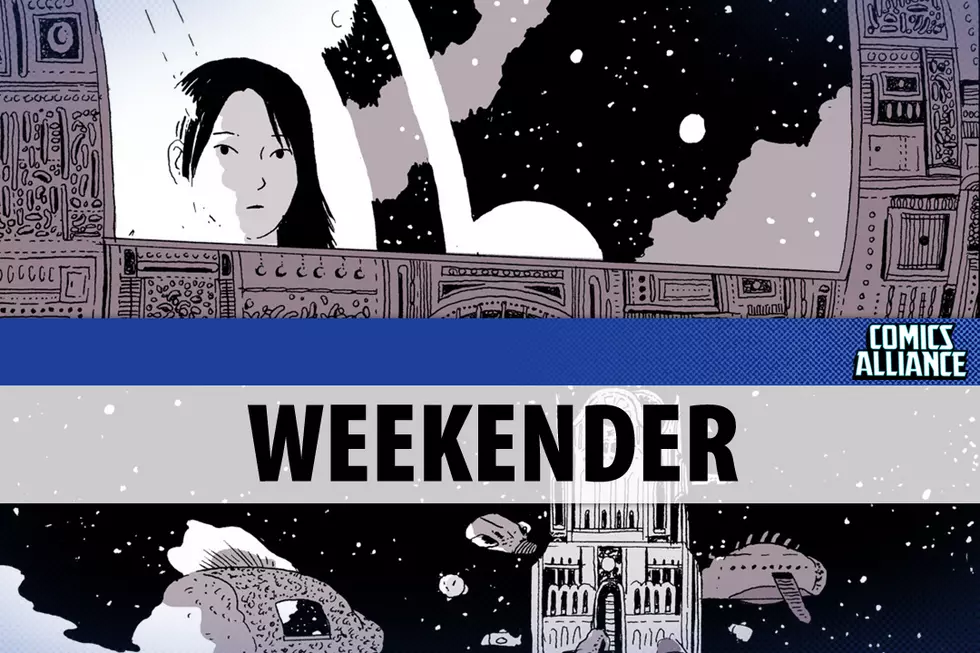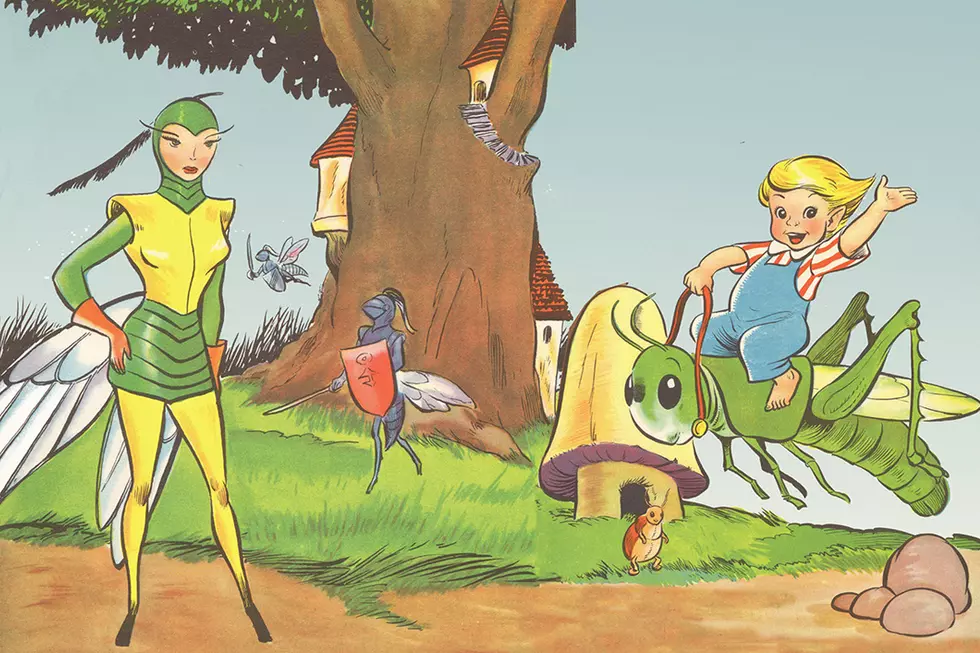![Our Boys: ‘Our Gang’ Vol. 4 and ‘Blazing Combat’ [Review]](http://townsquare.media/site/622/files/2010/04/book-covers.jpg?w=980&q=75)
Our Boys: ‘Our Gang’ Vol. 4 and ‘Blazing Combat’ [Review]

In any niche interest, there is a skewed view of history, an ordering of importance based on the people or events that contributed to your cause, your hobby, your particular area of focus. A sort of subject-matter nationalism -- we all have our own George Washingtons and Abraham Lincolns, whether they be named Coco Chanel or Orson Welles. In comics as in any particularized topic, we pick and choose who mattered and what's important to remember, and it is almost always on our own terms, unrecognizable to the larger culture.
Out this week from Fantagraphics are two softcover reprints of decades-old comics. "Our Gang" Vol. 4 is a new collection continuing the re-presenting of Walt Kelly's stories for the Dell Comics licensed version of the "Our Gang" movie series (maybe better known to some as "The Little Rascals"), this one covering the years 1946-1947. "Blazing Combat," which was released in hardcover last year, reprints the full run of the unsentimental black-and-white war comics of the same name, originally published in 1965 by Warren, edited and written by Archie Goodwin.
Both are excellent books that reward both casual readers out for cheap thrills and stodgier folks who want some textual and contextual analysis to roll around in like a pig in a pen. I'm of both camps, because while I like taking works on their own terms, I also find it unavoidable that these are curated historical artifacts. For whatever reasons, these works have been pulled from the mists of time and presented for our consideration. They have been deemed, on at least some level, important, if on no other level than "important enough to remember at all."

Both works come from early in their creators' careers. From our perspective on this end of history, the comic books like "Our Gang" that Walt Kelly produced for Dell were a pit stop on the way to fulfilling his ultimate role in comics history: creating "Pogo," one of the great comic strips of all time.
Archie Goodwin doesn't have that kind of singular, transcendent work to exalt. His achievements are sewn into the fabric of comic book culture, seeded throughout his years spent as an inseparable part of that culture. As it stands, "Blazing Combat" could be argued as his most "important" project, though his very successful career outlasted the four-issue magazine by more than 30 years.

As an historical curio, "Blazing Combat" has the most obvious high concept pitch: an anti-war comic made up not of didactic preaching but of rough, unsentimentalized views of war with graphic violence and moral ambiguity front and center, produced at a time when America was ratcheting up its involvement in Vietnam and the public had yet to widely turn against it.
The book was so daring it was banned from military bases, and the American Legion brought influence to bear with wholesalers to kill the book's sales (or so according to Jim Warren, the publisher. Archie Goodwin's take is far less self-aggrandizing; as he sees it, the book just wasn't a very good vehicle for Warren's fantasy and horror merchandise, which was the cash crop of the company. In this version, Blazing Combat wasn't the victim of a fearful government lashing out, but of the same thing all alt comics have been victims of: the narrowcast tastes of geekdom.)

"Our Gang" is a little harder to sell on its own as being of historical importance, and no wonder, since a large part of the reason for its reprinting is doubtless its creators' pedigree, earned for work done long after "Our Gang"'s publication. That said, while the comics may not be as obviously signposted as *IMPORTANT* as "Blazing Combat," they are a lot of fun. There are lady rasslers and fake matter transporters and escaped lions and a character named Boo Boo the Illustrious Clown.
Aesthetically, I find Kelly's line and layout a lot more pleasing than the work in "Blazing Combat," which is saying something as the lineup of artists in Combat includes John Severin, Wally Wood, Alex Toth, and more. "Blazing Combat" is in the narration-heavy EC mode of storytelling, though -- a lot of captions and thought balloons -- and while I can really groove to that kind of thing if I'm in the mood, it's never near as elegant as the kind of cartooning + dialogue driven style employed in "Our Gang."

Despite their very real immediate and aesthetic pleasures, both "Our Gang" and "Blazing Combat" really have to trade on some obscure niche history in order to prove themselves relevant and worthy of reading. "Blazing Combat," while a spasm against the constraints and traditions of comics, especially war comics, in 1965, was barely read at time of publication, and has survived until now through the efforts of people who care about it because they already care about comics and their history. "Our Gang" was a massively popular movie series in its day, but it has since faded far from the public consciousness, and were the comic not the early work of one of the form's full-fledged geniuses, it would just be another forgotten piece of merchandise.

Should this change how we think about these comics, and how we enjoy them? How do we judge these works? What do I value more: the political and formal revolutionary qualities of "Blazing Combat," or the aesthetic and biographical value of "Our Gang"? Does "Our Gang" deserve my attention because "Pogo" is brilliant? Is "Blazing Combat" diminished by Archie Goodwin's subsequent career in corporate, middlebrow comics, or do I look past the macro to the micro, the small victories for quality and taste he injected into the bloated rot of mainstream comics?
And how much should my love for that one "Batman" annual where he goes to Japan and is tricked by an old samurai gangster into helping him die an honorable death that Archie Goodwin wrote factor into this discussion?

I could spend ten essays diving into these questions and more like them, and if I were a better writer I could have touched on more notions in the space I've already used. For all our veneration of the past, our refusal to let go of properties and styles invented in the '40s and the '60s, we have just begun to scratch the surface in terms of crafting a wider, more interconnected historical narrative for comics as a whole and American comic books in particular.
I'm happy to be living through the golden age of comic book reprints, when the questions we didn't even know to ask are finally being prompted by the casual release of material I never thought I'd get to read without a lot of expensive back issue hunting and flea market haunting. I don't know how important any of it is, but it sure is fascinating to me, and you could do a lot worse than to venture in yourself.


More From ComicsAlliance









